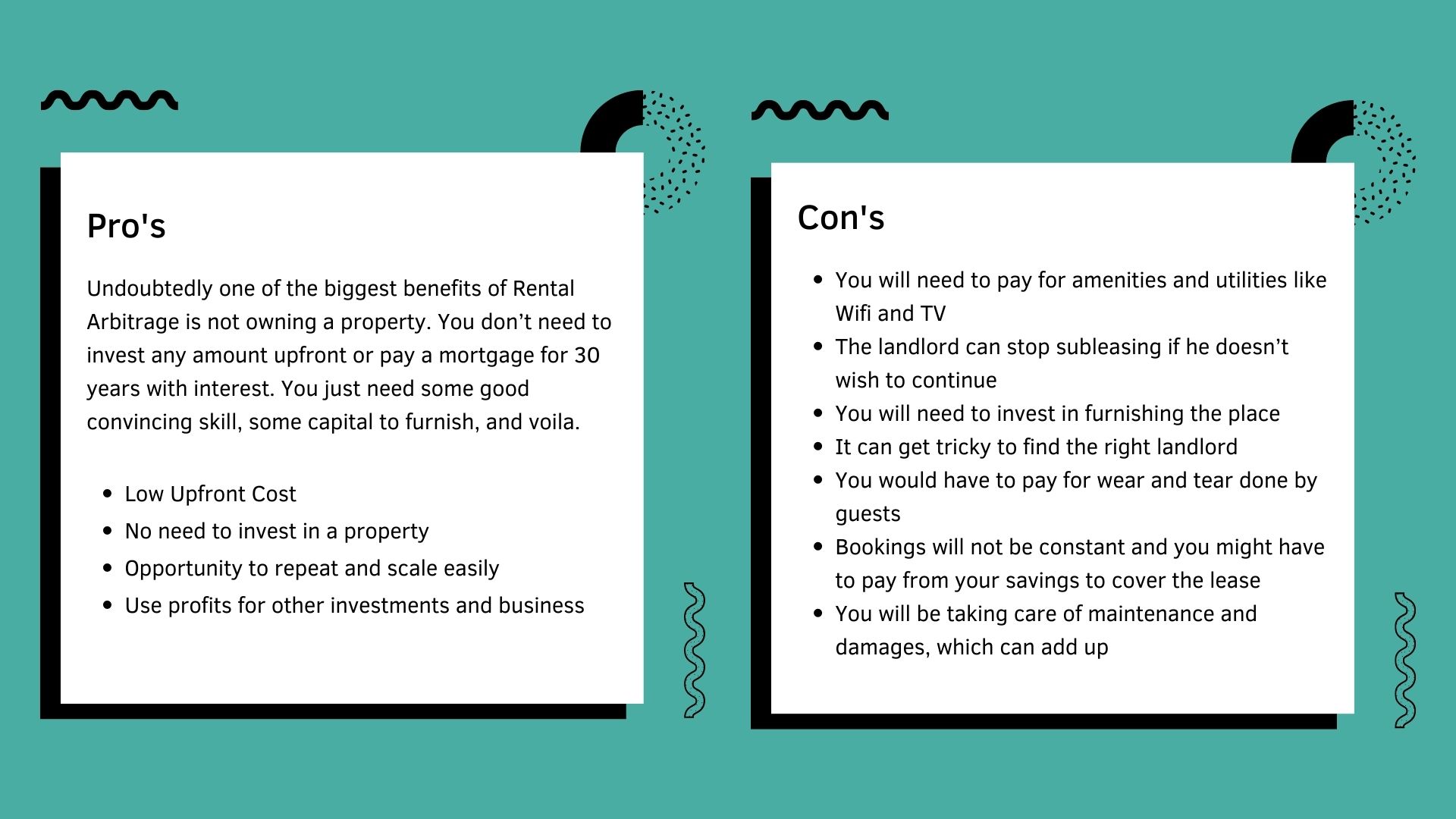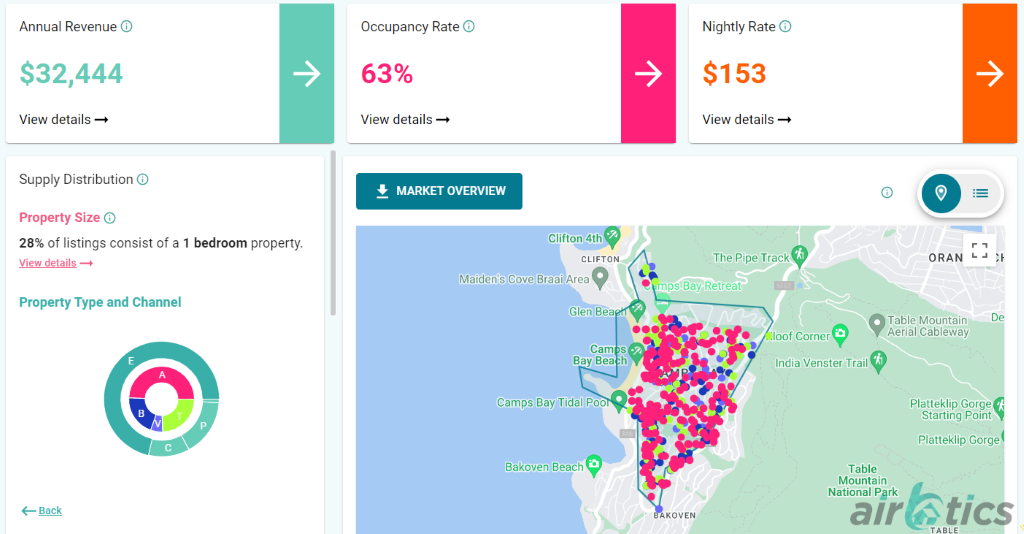What is Rental Arbitrage?
Rental Arbitrage is a profitable method of doing Airbnb in a rented property. This method is similar to house hacking, however, the only difference is that you don’t own the house. Instead, you convince a landlord to lease you a property that will be furnished and subleased on Airbnb and VRBO.
Rental Arbitrage is a smart technique to earn money in any type of property including multifamily houses, duplexes, or triplexes. You can easily use the money from your short-term rental to pay off your lease and profit some more. If you own a duplex or triplex then it is pretty straightforward and easy. You can live in one section and rent out the other – which is also known as house hacking. People use this after taking a loan on a property and use the rent to pay off the mortgage. The short-term rental income helps you pay for the long-term lease that you have on the house. This helps you keep the difference at the month-end after paying for the long-term lease.
To be specific, Cape Town is considered one of the digital nomad cities with high occupancy rates for Airbnb. According to Airbtics, an average host in Cape Town can earn up to $17,832 annually, especially during the peak seasons from November to January.
Assume you are renting a duplex in South Africa for $1,800/month. You are living by yourself on one of the sides and you decide to sublease the other on Airbnb. Let’s say you listed it for $100/day and got 80% occupancy. This will bring in approx $2,600/month in revenue. Not only will it help you pay off your complete rent, but give you a profit of $800. This, in a nutshell, is called Rental Arbitrage.
Check out this ultimate guide for corporate leasing & learn more about the business!
What are the things I need to do before getting started?
How to convince the landlord?
Let’s say you want to get into rental arbitrage. Now comes the big question, how to find a good property and how to convince the landlord. Later in the blog, we’ll be explaining how to find a good property by doing proper research using Airbnb data analytics. In this section, we will be focusing more on how to convince landlords. As you’ll begin your rental arbitrage journey, you’ll come to know that this is the hardest part of the whole process.
You need to be prepared and well researched, good communication skills come in handy here. Also, one thing to always keep in mind: never sublease without informing the landlord, there will be a huge number of people coming in and going out when you’re sub renting, and it will not be hard for the landlord to figure out that you are subletting and you might end up getting in trouble.
To convince the landlord, rule number one is always talking about the upsides. If you can rent the property on Airbnb, so can the landlord himself. You need to make a deal with the landlord that is beneficial to them. So they lease the property to you instead of renting it by themselves.
Points to tell an indecisive landlord:
Doing Rental Arbitrage is a full-time business. It doesn’t generate passive income like long-term leasing. You should try approaching older people who are looking for some sort of passive income. They are more likely to agree to a fixed long-term lease. You can also reach out to full-time working professionals or business owners. They will also be happy with a source of passive income till their property is well maintained. This brings us to our next point.
- You are more likely to take care of the house than a normal renter. As you are using the property to do business you will take good care of it to make sure you get better reviews. Having a beat-up property isn’t good for business and you are more likely to monitor it often. Not monitoring it will affect your revenue a lot. You may end up paying a huge sum of money for damages done by someone else. So telling this to the landlord might instill some confidence in them.
- You can ensure timely monthly rent. You can tell the landlord that doing Rental Arbitrage is a full-time business with ups and downs. It doesn’t guarantee fixed income at all like long-term leasing. But if they lease it to you, you’ll make sure to pay the lease no matter what. Either from the money made after rental arbitrage or from your savings. You need to ensure timely monthly lease payments to gain the trust of a landlord.
In conclusion, you need to take care of the property like your own and make sure to timely pay the monthly lease on time and keep the situation beneficial for both parties.
Ensure the Property and Gain the landlord’s trust
Being on the safe side is always a good idea. From troubling guests to bothering landlords. You need to make sure you are using the right tools to ensure the property is safe and neighbors are happy. Many landlords will have this concern when renting out their property to you. They will be worried about neighbors raising noise complaints. It is a legitimate concern. To help you with all these problems, here are some suggestions that you can implement and have peace of mind.
- SimpliSafe– These are home monitoring tools that you can install in the house to make sure no suspicious activity is happening there. Make sure to let the guests know about them and have their consent.
- Auto host– Automatically screens problematic tenants.
- Alexa Guard: If you already own an Alexa, you can use its Alexa guard feature to detect parties. It is an inbuilt feature that monitors changes in sound and sends you an alert in case the guests are having a party and making too much noise.
- InsuraGuest– This insurance and tech company helps you with risk analysis and gives protection beyond Airbnb and VRBO policies.
- Airbnb Profit Calculator– Give your landlord ease of mind by providing income estimates backed by Airbnb data.
You can integrate the majority of these tools with a PMS of your choice.
Pros and Cons

What is the initial cost of starting a rental arbitrage in South Africa?
You can expect to spend anywhere between $3,000 to $5,000. This cost includes Deposit, Furnishing, Amenities, Legal Paperwork, and LLC Incorporation.
But doesn’t this contradict the Low upfront cost of Rental Arbitrage? Well, these estimates vary from city to city. There is a possibility to do Rental Arbitrage for even less than this depending upon your situation and the type of property you lease.
Still, the amount is lesser than investing in a new property and getting a mortgage of thousands of dollars. In addition to this, you won’t be on the hook for property maintenance expenses and being stuck for years with debt.
But this doesn’t mean Rental Arbitrage can be done with zero or a very tight budget. There will be some upfront costs that you have to expect so it’s ideal to own some extra cash is also a good thing to have. This will help pay off the lease during the off-season in case bookings don’t happen right away.
Expense 1: Rental Deposits
A rental deposit is going to be one of the first major expenses. You would need money to be able to sign a long-term lease with the landlord. Therefore, you will need a security deposit, along with your payment for the first and last month’s rent. Sometimes you can negotiate with the landlord and use the first month’s rent as a security deposit.
Expense 2: Furnishing
Most of the time you should always aim to lease a place that is semi-furnished. As someone with a fully furnished home might be doing short-term rentals themselves. Also furnishing a place from scratch can add anywhere from $3,000 to $5,000 to your initial capital.
If the place is semi-furnished, then your best bet is to shop for cheap stuff. You can go and find cheap supplies from places like Home Depot and IKEA. Sometimes even Walmart can have a hidden gem if you look closely.
Expense 3: Photography
Do it yourself! iPhones have good cameras. DIY photography will save you some money.
Expense 4: Cleaning Services
This is included in the starting costs, but you will eventually end up spending on cleaning services. The best way to save money is to do it yourself initially if you have the skills and experience.
If you have no experience or don’t want to invest time in cleaning a place. Then your best bet will be to hire a professional cleaner. This can cost you anywhere from $50 to $250 depending upon the size and location.
Expense 5: Legal Consultation
Maintaining a professional relationship with a Real Estate lawyer can be very helpful in the Airbnb business. Airbnb regulations keep updating and you would need some legal guidance on the way to adjust your business accordingly.
They can also come in handy if you face any legal issues with the landlord or guests. They can help in damage claims and insurance as well in case of any mishappening.

Legality and Regulations in South Africa
With Airbnb accounting for over 93 percent of all accessible short-term rentals in Cape Town, it’s no surprise that the phrase “Airbnb” is on nearly every community scheme’s radar. There are presently 20,300 postings available in Cape Town, with more than 5,000 items available in Johannesburg.
While many people have hailed Airbnb for revolutionizing the renting sector in many places across the world, it has also been a significant target for governments, local governments, neighborhood councils, and, predictably, community groups.
The major reason for this objection is namely the belief that short-term rentals cause trouble to both homeowners and neighbors. Neighbors’ jealousy for not having the same business attitude to join the short-term rental revolution may get to this “annoyance.“
The second, less visible reason is that it has had a detrimental impact on the availability of homes for residents to utilize for regular long-term rentals.
However, no law in South Africa prohibits short-term rentals in general. To address the issue of short-term rentals, each city can create and enforce ordinances and zoning rules. Airbnb rules in Cape Town have no regulations expressly addressing these concerns.
If a city does not expressly ban short-term rentals, the next step is to review the laws and constitution of the Body Corporate or Homeowners Association, as applicable. The majority of these organizations will have leasing policies in place. If the regulations aren’t in favor, homeowners must talk to management agents about their potential Airbnb listing.
Reference | Property Law | Property24.com
Best areas for Rental Arbitrage South Africa

According to our Airbtics Dashboard, De Waterkant is one of the top markets to start your rental arbitrage business. There are more than 273 Airbnb listings with 14 private rooms properties and 155 one-bedroom properties. The monthly revenue for most properties is more than $2,117 per month with occupancy being more than 76%.

According to our Airbtics Dashboard, Camps Bay is the second-best market to start your Rental Arbitrage business in Africa. There are more than 293 Airbnb listings with 47 private rooms properties and 68 one-bedroom properties. The monthly revenue for most properties is more than $2,704/month with occupancy being more than 63%.




